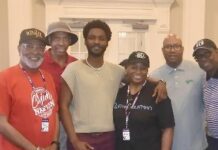*On Thursday, November 9, 2017, a “Clips and Conversation” was held at the Regency West in Los Angeles, where a panel of civil rights notables discussed several of the social justice issues touched on in the newest Denzel Washington movie, “Roman J. Israel, Esq.”
On hand to take part in the discussion were Civil Rights Attorney Nana Gyamfi, Author Dr. Anthony Samad, Journalist and Political Commentator Jasmyne Cannick and Roman J. Israel, Esq. Writer and Director, Dan Gilroy.
The discussion was moderated by Gil Robertson, the President of the African American Film Critics Association (AAFCA).
Roman J. Israel is a civil rights criminal attorney and apparent savant who happens to be in some sort of time warp. Everything about him, from his afro to his clothes and even the music in the movie, is a throwback to the 1970’s. Unlike other Denzel characters, Roman is anything but a smooth, slick fast talker. He is socially inept and on the autism spectrum.
Roman has spent the last 40 years of his life fighting the good fight against an unfair justice system. He has been in the background of a two man law office for years; the neck that turns the head, if you will. When his partner falls ill, he now has to come from behind the scenes, be thrust into the forefront and deal with courtrooms, prosecutors and judges, something to which he is very unaccustomed, since he has not been in a courtroom in decades. Suffice it to say, Roman J. Israel’s social awkwardness is very un-Denzel like.
The panel discussion began with “Roman J. Israel, Esq.” Writer and Director Dan Gilroy sharing why he decided to make the movie. He mentioned watching what has transpired over the last 40 years, saying during the 1970’s, “It seemed like the world was on fire with this spirit of making the world a better place. Civil rights was going on, women’s rights, there was an anti-war movement. Everything seemed to be on the table. I was very fascinated.”
Dan went on to say things have dissipated since the activists of the 60’s and 70’s, (e.g., Huey Newton, Bobby Seale, Angela Davis, Abby Hoffman, Jerry Rubin, Malcolm X and Martin Luther King) and five or ten years ago, he started to wonder what people did not need the 60’s and “what people literally were not affected by these four decades of indifference and political horror?”
Dan’s research showed that many civil rights activists went into activist law and some supported themselves by doing criminal law. He became fascinated by Johnny Cochran, who was inspired by another civil rights lawyer, former Supreme Court Justice Thurgood Marshall. I guess Roman J. Israel was the next logical step.
“Roman J. Israel, Esq.” was written specifically for Denzel Washington and according to Dan, “If Denzel didn’t do it; if Denzel didn’t want to do it, I would not have done the film.” He continued to say, “Denzel is a man of faith” and the only person he thought could do the film.
Denzel, who has 28,000 songs on his Ipod, played a major role in deciding the music for the film. Since Roman is basically coming out of a time warp, the music establishes the time and era and according Dan, Denzel said up front, “My character does not listen to anything past 1977.”
Jazz Saxophonist Pharoah Sanders can thank Denzel for his music being in the film. Denzel decided that was the song he wanted Roman to come in on. Why not? Denzel listened to the song 5,000 times in 1977, so I’m sure his fans won’t mind giving it a listen. Funkadelic’s “Cosmic Slop” is also in the movie. They can also thank Denzel because it was included after Dan watched Denzel listen to it for three hours.
Clips from the movie relating to advocacy, unfair sentencing, bail, gender bias and generational gaps were showed and discussed.
When asked why the scene where Roman gets fined $5000 for contempt of court, while arguing over whether or not his client had been detained garnered such a jubilant response from her, Civil Rights Attorney Nana Gyamfi stated many lawyers are not willing to take the $5000 hit when they know things are wrong and Roman was willing to take the hit.
Gender roles was touched on due to a classroom scene where Roman questions why the females are standing and the males are sitting. Jasmyne Connick shared her perspective on today’s gender issues, saying things are changing so much, that even as a lesbian she is having trouble keeping up with all the gender definitions.
A clip from the movie where Roman is displeased with the amount of prison time being offered his client sparked discussion regarding criminal proceedings.
Gil Robertson explained there is “Often a rush to judgement that leads to high rates of incarceration.” Jasmyne Cannick added that as part of criminal justice reform, bail reform will be huge in 2018. She explained California, “Puts everyone in jail” and that most black, brown and poor people do not have the money to get out and end up sitting in jail waiting on trial. She said the film showed her a lot of what she sees every day, e.g, the District Attorney doesn’t want to lose their high conviction rate, so they want people to take “whatever deal is on the table” and a lot of people don’t have the benefit of private counsel or activist attorneys, so they end up taking deals that are not in their best interest. She said she appreciated that element of the film because the plea process is not talked about.
Nana Gyamfi added it isn’t just a question of people being under resourced. The issue is the whole system is designed for black people to be convicted and it works because blacks don’t go to jury duty and the jury is made up of “engineers and police from Simi Valley” and the accused will be afraid and take the plea deal. She continued, “At the end of the day, we have a system that depends upon people bending to the weight of the system.”

The subject of advocacy sparked the most conversation. According to Dr. Samad, today’s activists see our community is “drowning in the shallow end of the pool” and there is “simplistic advocacy” and referred to protesting police killings as, “Low hanging fruit” because it is easy to see and it is harder to protest things that are not so obvious. For example, it is difficult to protest the purging of black professors that is currently taking place across the country.
He also spoke about the decline in the admissions rate of African-American students, the lack of resources to go to college and the fact that young people are graduating from college owing $100,000 in debt, when in the past people went to college for free. Dr. Samad stated Roman does not take the advocacy of this generation as seriously as he would take the advocacy that came from his time, so there is a disconnect in that regard.
Dan Gilroy let us know that it was his intention to highlight the generational divide pointing out there is a 20th century mindset and a 21st century mindset and Roman is coming out of this back room 40 year mindset of national movements and national solutions, when we now live in an age where the problems are so systemic that we have to talk about them individually.
Jasmyne added when she was working on a movie she produced, “41st and Central: The Untold Story of the Black Panther Party,” she noticed the serious battles that were being waged and the amount of work being put in, so she understands when Roman says what’s going on in advocacy today is not real work. She feels the older and younger generations are both disrespectful to each other.
Nana said she has worked with the National Council of Black Lawyers, whose slogan is, “The Legal Arm of the Black Revolution” and the battles are not that different. According to her, “It’s different because the moment is different.” She said in the 60’s people were being killed and sent to jail for indeterminate time periods and that is now coming back. Nana further explained this movement is being rooted in those who have been “discarded and disowned;” people who are blocked before they even get to the point of higher education and stressed it is important to make the connection between the people of old and new and not be so disdainful of one another generationally and realize we all want black liberation, so “let’s get together and let’s get free.”
Dr. Samad said those in the 60s and 70s were dealing with a more structured confrontation that was legally sanctioned. Today’s young people have the platform that was not available in the 60s, 70s, 80s and 90s. Dr. Samad added just because you show up does not make you an activist and further stated there is a situation in Los Angeles today where one of the leading voices who calls himself an activist is really a police informant and they sit in meetings with him and that is the disconnect. Dr. Samad says advocacy will never work because there is always someone at the table.
Denzel’s Roman J. Israel character is by no stretch of the imagination a man of means. He looks haggard, tired and beleaguered He is a man that has made sacrifices, which prompted the moderator to ask the panel members to discuss the sacrifices they have made in their fight for civil rights.
Both Nana Gyamfi and Jasmyne Cannick shared that their sacrifices have been financial. Nana, a Cornell and UCLA grad admitted her dad asked her, “What are you doing?” when he discovered her career path (i.e., Civil Rights attorney.) She also mentioned that although people associate lawyers with having money, it is not the case because most of their clients are “us” and sometimes her rent does not get paid.
Jasmyne also mentioned her sacrifices have been health related because she doesn’t have the time to do what she needs to do for herself (e.g., go to the gym.) She also mentioned she feels guilty because although she works countless hours, she believes she could be doing more. Nana echoed her sentiments. Sounds a tad like stress, which leads to high blood pressure. I’d say those are reasonable concerns.
Dr. Samad admitted his sacrifices have not been financial because he was making $60,000 when his friends were making $12,000. His personal sacrifices were the threats made against him as an activist.
The final question of the evening from Gil Robertson was “What is your legacy and what are you doing to move your legacy?” Jasmyne Connick started by saying, “We have a president that is literally trying to get rid of us.” She has not thought about her legacy and feels she is too young to think about her legacy and says when you are busy doing the work, you don’t have time to think about your legacy. According to Jasmyne, “too many Blacks do not know their role” and that “everyone can’t be on the front line.” She hopes the movie sparks conversation.
Dr. Samad, who feels you are never too young to think about your legacy, is concerned about his grandchildren. He has spent 15 years as an activist and another 25 outside of direct activism as an instructor. He is retiring from the Community College District this year and will run the Mervyn Dymally think tank. His legacy will be teaching people.
Attorney Gyamfi says we need to always be thinking and making sure the next generation is okay. She is involved in Justice Warriors for Black Lives and wants to write three books; one on going to court, one on retaining our culture and one relating to women’s roles.
Dan Gilroy says his legacy is when he meets his maker and what it all adds up to. He wants to give a good account of himself and to know that he used his tools wisely.
The Clips and Conversation for “Roman J. Israel, Esq.” was very informative and worked effectively in tandem with the movie. It touched on several very important social justice issues.
The movie starts in limited release on Friday, November 17th and nationally on November 22nd. Be sure to check out Denzel like you’ve never seen him before.

Marilyn Smith is a Los Angeles based writer/reviewer. Contact her via [email protected].
We Publish News 24/7. Don’t Miss A Story. Click HERE to SUBSCRIBE to Our Newsletter Now!







